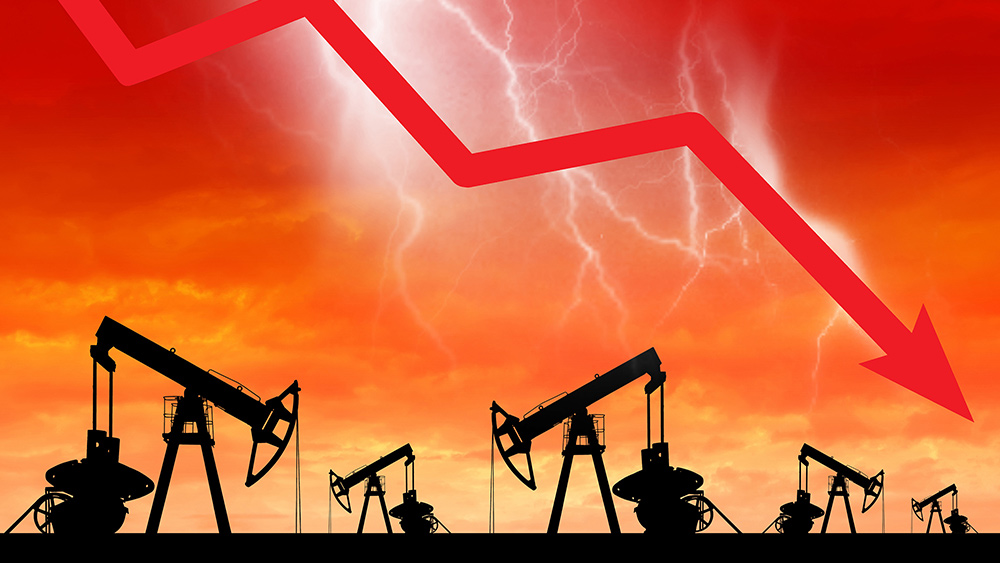US oil price to surge again in December as Saudis cap production and EU embargo takes effect
11/01/2022 / By Mary Villareal

Another oil price surge is expected in December in the U.S. if a European embargo on Russian oil goes into effect and the Saudis refuse to increase production to make up for the anticipated drop in supply.
Saudi Arabia has issued a warning aimed at the U.S. over crude oil and supply agreements, with Prince Abdulaziz bin Salman, the kingdom’s oil minister, accusing unnamed countries of using their emergency oil reserves to manipulate markets rather than help them with shortages of supply.
These remarks come after the Biden administration authorized the release of another 15 million barrels of crude from the U.S. Strategic Petroleum Reserve as it tries to curb the elevated gasoline prices in the wake of production cuts from OPEC+ countries.
Bin Salman said it is his “profound duty to make it clear to the world that losing emergency stock may become painful in the months to come,” adding: “Running out of capacity has a much dearer cost than what people can imagine.”
The Saudis also claimed that the cuts are an attempt at balancing the market, which is not lacking any more crude but is suffering from a lack of refining capacity, a crisis in the natural gas market and too rapid transition to renewables that weigh on current hydrocarbon investment.
Meanwhile, Biden is still in the middle of formulating a clear policy stance, although he said “there will be consequences” for U.S. and Saudi relations. According to him, the administration is particularly concerned about the Kingdom’s growing ties with Russia and China, and the market volatility that is expected once a European oil embargo goes into effect on Dec. 5. (Related: Saudi Arabia may increase oil prices amid Russia-Ukraine war.)
Saudi Arabia cuts oil production
U.S. officials are also accusing Saudi Arabia of flip-flopping on oil production, with the Biden administration believing it had purportedly reached a secret deal with Riyadh over the boost of oil production and lower energy prices.
Instead, the Saudi-led OPEC+ said it would cut production by two million barrels of oil per day, leaving Washington fuming at what they said was a broken promise.
“What Saudi Arabia did to help [Russian President Vladimir] Putin continue to wage his despicable, vicious war against Ukraine will long be remembered by Americans,” Senate Majority Leader Chuck Schumer (D-NY) said.
Two anonymous Saudi sources familiar with the matter noted that the Kingdom pushed the oil cut twice as much as Russia intended, which means that there could be motives that “run deeper than what top Democrats want to admit.”
Originally, Russia sought to implement a one million barrel per day cut, which would have been only half of what was later agreed upon.
On Oct. 14, White House National Security Council Spokesperson John Kirby accused Saudi Arabia of coercing other OPEC+ members who did not initially agree to the cut.
“The Saudi foreign ministry can try to spin or deflect, but the facts are simple,” said Kirby, alleging that they knew the oil production cut would increase Russian revenues and blunt the effects of the sanctions against Russia amidst its war with Ukraine.
However, the cuts are necessary to address price distortions in the energy market, according to OPEC+ officials. Despite accusations that Saudi Arabia is choosing to side with Putin in the energy war, other nations have rallied behind the Kingdom’s defense.
Turkey’s foreign minister told American leaders to stop “bullying” Saudi Arabia for the production cut. Meanwhile, Indonesia’s finance minister said the West’s economic sanctions on Russia, such as the price cap plan for Russian oil, are creating uncertainty for commodity exporters, which likely influenced the production cut in the first place.
Visit FuelSupply.news for more information about the OPEC+ cuts in oil production.
Watch the video below to learn more about how Saudi Arabia’s actions could affect inflation in the United States.
This video is from the Self-Government channel on Brighteon.com.
More related stories:
Sources include:
Submit a correction >>
Tagged Under:
chaos, collapse, crude oil, Europe, export ban, fuel supply, inflation, market crash, oil prices, oil production, oil supply, OPEC, panic, petroleum, products, Russia, Russia-Ukraine war, Russian oil, Saudi Arabia, Saudi Aramco, WWIII
This article may contain statements that reflect the opinion of the author
RECENT NEWS & ARTICLES
COPYRIGHT © 2022 Rationing.News
All content posted on this site is protected under Free Speech. Rationing.News is not responsible for content written by contributing authors. The information on this site is provided for educational and entertainment purposes only. It is not intended as a substitute for professional advice of any kind. Rationing.News assumes no responsibility for the use or misuse of this material. All trademarks, registered trademarks and service marks mentioned on this site are the property of their respective owners.




















